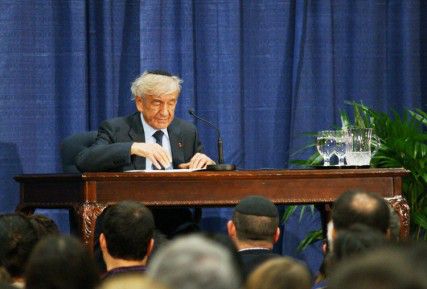Boston University professor Elie Wiesel addressed the perceptions surrounding martyrdom and suicide in Jewish culture as he spoke before hundreds of students Monday night.

In Wiesel’s lecture, “In the Talmud: Is Martyrdom or Sanctification of His Name a Valid Response?” he focused on whether the act of martyrdom was accepted or legal in Jewish culture.
He said suicide is forbidden in Judaism, as life is always of greater importance than death.
“When a wedding procession encounters a funeral procession, it is the latter who stops, allowing the wedding procession to proceed,” he said.
The lecture, held in BU’s Metcalf Hall, was the second of Wiesel’s three annual talks.
During his lecture, Wiesel lectured on both traditional Jewish culture and his personal history.
“A tortured person dies more than once, and his or her memory lasts a lifetime,” he said.
Wiesel drew on examples from religious texts to support his argument. He gave an illustration of martyrdom by introducing the three largest sins of Judaism: idolatry, or worship of a false idol, murder and adultery.
Wiesel used the story of Rabbi Hanina as an example of martyrdom. Hanina defied Roman law and taught the Torah. As a result, Hanina was sentenced to death and Roman soldiers burned him to death at the stake as punishment.
“We are always amazed at the life and death of these great teachers,” Wiesel said.
He said suicide was uncommon even during the time he spent in Auschwitz during the Holocaust.
“Usually suicide was not for us an option … we do believe that we can honor the creator who gave us life by living,” Wiesel said.
Professor Steven Katz, director of the Elie Wiesel Center for Judaic Studies, provided the introduction for the lecture.
“The theme [Wiesel chose] is a highly potent one,” Katz said. “Martyrdom is one of the formative elements of Judaism.”
Some students said they attended because they felt connected to Wiesel through Judaism.
“I thought it would be a good learning opportunity to hear him talk,” said Carly Baxer, a College of Communication junior. “I’m Jewish so I’ve learned about him. I thought he was a really good speaker, he is very intelligent.”
Nate Klein, a COM freshman, said he was motivated to attend by Wiesel’s legacy.
“I was really interested in hearing Elie Wiesel speak because of who he is,” he said. “I wanted to take advantage of this opportunity.”
Klein said Wiesel’s breadth of knowledge was notable.
“I was really impressed by his knowledge of Jewish history and his weaving together different stories about martyrs in ancient times,” Klein said. “His stories about the Holocaust and how he related them to the ancient martyrs was very powerful and moving.”
College of Arts and Sciences sophomore Isaiah Dicker said Monday night was not her first time seeing Wiesel speak.
“I saw him last year, and it was a very interesting lecture,” she said. “My grandparents attended a few of his lectures and they always said he was a captivating speaker.”
The lecture will be rebroadcast on Oct. 28. Wiesel’s final lecture of the series is titled “In Contemporary Writings: Open Heart” and will take place on Oct. 29.
























































































































John • Nov 11, 2012 at 11:32 am
This is a self center proclamation. In other words directed to the juwish communty.